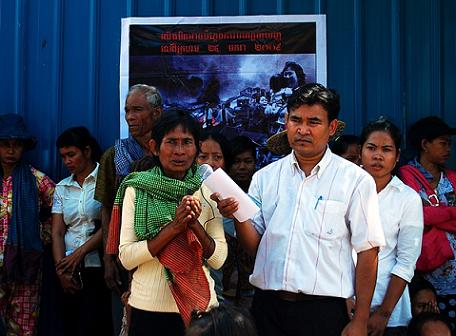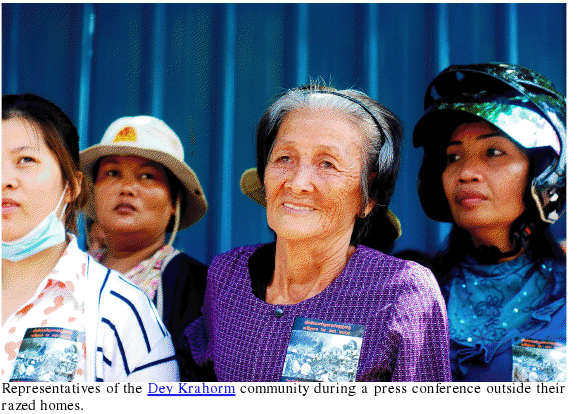
The draft law, in a likely violation of freedom of expression which is protected both in the Cambodian Constitution and the ratified International Covenant on Civil and Political Rights (ICCPR), makes it mandatory that any group of Cambodians (including clubs and networks) operating as a non profit in Cambodia register with the government. These bodies also have to fulfill a number of complex and technical registration requirements. If they fail to do so, the government has a ‘legitimate’ excuse to prevent them from operating. The Cambodian League for the Promotion and Defense of Human Rights (LICADHO), a human rights organization operating across Cambodia, dubs this approach the “tyranny of the technicality” and believes it is likely that the government will use this power to shut down entities advocating for human rights or reporting on government corruption.
For ‘informal networks’ or loosely associated groups of individuals like farmers and taxi drivers, who do not have the means to open bank accounts or have formal office addresses, these requirements could severely impair their ability to register. It may force a majority of them to operate illegally, rendering them even more vulnerable. These networks are key partners in the development process, providing first-hand information on the situation of at-risk groups in the country and assisting international donors who continue to fund about half of the Cambodian government’s budget.
While these concerns may seem speculative, there have already been a number of recent situations foreshadowing what is to come. For example, the Ministry of Interior, without any clear justification, arbitrarily closed an NGO called Sahmakum Teang Tnaut (STT). A few weeks before, the NGO had published a report finding that the compensation offered by the government to households affected by a government railway project and slated for resettlement was too low.
LICADHO’s director, Naly Pilorge, perhaps best summarized the overall effect of the NGO Law were it to pass: “Everything that would happen to informal networks under the draft law is already happening now [like STT being shut down]. If the law passes, it legalizes these restrictions.”
Repression through new laws
Activists believe the NGO Law is representative of a larger trend by the Cambodian government to use ‘repressive’ legislation to impair freedom of expression and assembly.
During his recent unofficial visit to the country, Frank La Rue, the UN Special Rapporteur on freedom of expression and opinion, dubbed this emerging Cambodian style of governance a “legal dictatorship.” Surya Subedi, the current UN Special Rapporteur on the situation of human rights in Cambodia, has called it a “legal offensive.”
Along with the NGO Law, the new Penal Code and the Law on Peaceful Assembly also facilitate this trend of repression through the courts in Cambodia.
Commenting on the Penal Code, the Cambodian Minister of Information, Khieu Kanharith, said: “Before, using the argument of ‘freedom of expression’ and opposition party status, some people could insult anybody or any institution. This is not the case now.”
Human rights bodies in Cambodia are particularly concerned by the possibility that Penal Code provisions like incitement to commit a felony and defamation will be indiscriminately used to silence activists in the same way the crime of disinformation under the former UNTAC Criminal Code was applied.
Two recent cases justify this concern:
A LICADHO staff member was charged with incitement during his appeal hearing in July. Originally charged with disinformation for distributing anti-Vietnamese pamphlets, the judge not only violated international fair trial standards, but also clearly affirmed that the court believes that this type of political leafleting can actually constitute an act to cause unrest in Cambodia or ‘incitement.’
A second case is that of Seng Kunnaka. In December 2010, Kunnaka, an employee of the World Food Program, was convicted on a charge of criminal incitement under the new Penal Code for printing and sharing material from KI-Media, an online blog that aggregates information critical of the government. He was sentenced to six months in jail and a $243 fine.
The third ‘repressive law’, the Law on Peaceful Assembly, is primarily giving the authorities a means to isolate and neutralize protests. The law provides for the creation of “Freedom Parks” across Cambodia. These parks are assigned zones for peaceful protests of up to 200 people. They are typically isolated from heavily trafficked areas. Authorities use the existence of these parks as an excuse to disperse peaceful assemblies not happening within their confines.
 As Seng Sokheng, a representative from Boeung Kak Lake, explained: “The Freedom Park [in Phnom Penh] is to be used by people protesting but it is a small place and only a small number of people can go to the Park and express themselves. It’s not really something that can help because people can’t go into the streets or go march elsewhere to get attention of the public or the relevant government institutions. When we want to go into the streets to express our rights, we are faced with arrests.”
As Seng Sokheng, a representative from Boeung Kak Lake, explained: “The Freedom Park [in Phnom Penh] is to be used by people protesting but it is a small place and only a small number of people can go to the Park and express themselves. It’s not really something that can help because people can’t go into the streets or go march elsewhere to get attention of the public or the relevant government institutions. When we want to go into the streets to express our rights, we are faced with arrests.”
In addition to creating Freedom Parks, the law essentially requires that the authorities approve any public protest. There are also indications that the law applies to private meetings. Article 14 of the law stipulates that a written notification with signatures or thumbprints and identification cards for three leaders of the peaceful assembly shall be required when the peaceful assembly is to be held “at the places of private property (…)”.
In its report on freedom of expression in Cambodia, the Cambodian Center for Human Rights (CCHR) reported a case where authorities prevented teachers from meeting in a private residence by saying they required permission to do so. Trade union leaders also face similar harassment. “The authorities often prevent us from meeting [workers in the provinces], including threatening workers from participating in this kind of meeting,” said Sar Mora, head of the Cambodian Food and Service Workers’ Federation (CFSWF).
As journalist Elizabeth Becker wrote recently in the New York Times, despite the Paris Peace Agreements, UNTAC and continued development support, the situation in Cambodia is bleak: “Cambodia today is essentially ruled by a single political party with little room for an opposition, has a weak and corrupt judiciary, and the country’s most effective union leaders have been murdered.” It is also disconcerting that officials like La Rue, believe that the enactment of ‘repressive legislation’ is part of a regional trend.
A grassroots campaign
While civil society actors have largely exhausted both domestic and international mechanisms in an attempt to curb these activities, there are signs that a popular movement around the government’s repressive behavior is stirring.
Groups suffering from land rights evictions in both rural and urban areas are increasingly joining forces and coming to Phnom Penh to protest together. This type of collaboration inspires lawyers like Sunrith Ham, who works with LICADHO. “How can you change injustice? How can you change the attitude of the government? Hope comes day to day, from the people. It does not come from institutions or the policymakers,” said Ham.
Mass mobilization has already had some success in Cambodia. In 2008, for example, over a million people thumb printed a petition lobbying for an anti-corruption law. However, the likelihood of this succeeding is dependent on continued international support to these groups, as well as donors taking decisive action (like the World Bank seems to have done) against the Cambodian government.
Siena Anstis is a Swedish-Canadian law student (BCL/LLB McGill University 2013), freelance journalist and development communications consultant currently based in Montreal, Canada. She recently completed a legal internship with the Cambodian League for the Promotion and Defense of Human Rights in Phnom Penh. Previously, she worked with Battery Operated Systems for Community Outreach (BOSCO) in Northern Uganda and the Aga Khan Foundation in Nairobi, Kenya. Recipient of the 2009 Canadian International Development Agency (CIDA) Journalism and Development Award, she has written about ICT4D, human rights and other social issues in Syria, Cambodia, Kenya, Uganda and Kosovo. She is also founder and advisor for Women of Kireka, a women’s cooperative in Kireka, Uganda and Project Diaspora team member.
